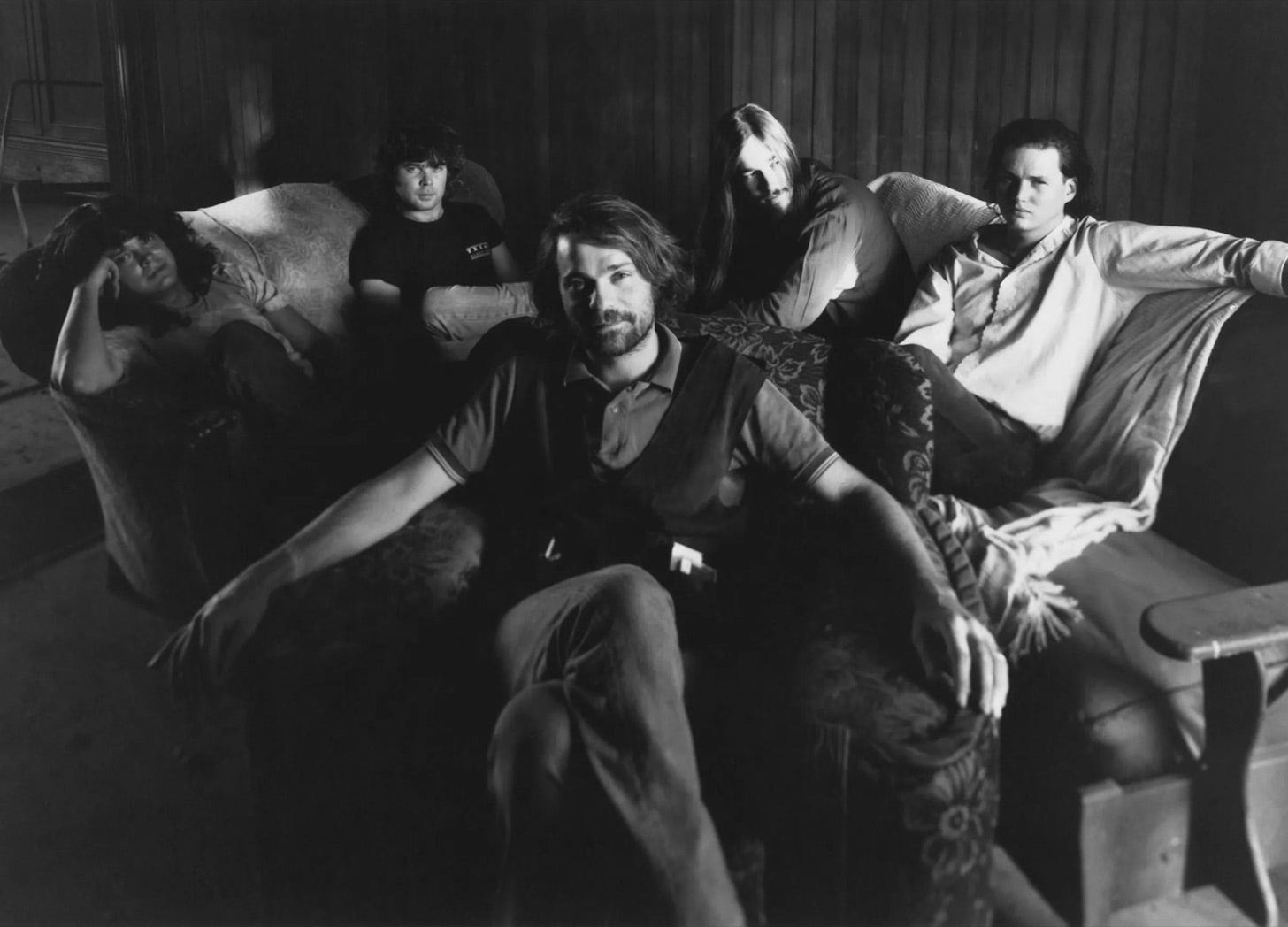The other day, I watched the new four-part Tragically Hip documentary, No Dress Rehearsal. To be honest, the day it was released. I'm one of those Yanks who love The Tragically Hip.
Discovery
In what seemed like another life, I met a friend from Canada who turned me on to the band. It was our first day of art school, and we swapped bands we liked. We bonded over The Replacements and built out from there.
When he mentioned the band name, I thought to myself, "The Tragically Hip has got to be the coolest name for a band. " When I heard the first few notes of "Blow At High Dough," it seemed the music was just as cool. I was hooked. And then the first line, "They shot a movie once, in my hometown," closed the deal.
While my friend was getting his MFA in illustration, I was a film student, so the first line struck a chord.
Now, he likes to tell me that we saw “the hip” at CBGB's in the early fall of that year, but I have no recollection of this. I want to think I would remember, but I was young, drunk, and this was New York City, so anything was possible.
At the time, The Tragically Hip's only full-length album was Up To Here, which was in full rotation that first year.
The Album
By the time Road Apples was released in 1991, much had changed. I was still buddies with my friend from up north, but I was no longer in art school. I was working full-time and taking a run at a traditional university.
Oh, and I’d also fallen in love.
Much like my Canadian friend, she and I bonded over The Replacements and built out from there. As he had introduced me to them, I introduced them to her.
She was a convert when Road Apples was released here in the States.
The album's original working title was Saskadelphia, but the record label rejected it as likely to confuse listeners, which, objectively speaking, is fair. However, the title was later used for a 2021 EP of previously unreleased rarities from the Road Apples sessions.
Recorded in New Orleans at fellow Canadian Daniel Lanois' studio, Road Apples is a straight-on rock record, but something was different. You could feel it, and the more you listened, the more you could hear it.
I'll admit to not liking the album immediately. It wasn't a radical departure from Up To Here, but there was something different about this album that I couldn't quite put my finger on. I would find out why it was different in No Dress Rehearsal. I won't spoil it for you here in the event you want to watch it… and if you're a fan of music documentaries, you should.
Road Apples would mark a thematic pivot point for the band.
You can start with the title of the record, Road Apples, which is Canadian slang for horse poo. Apparently, in Canada, it can be found along the side of roads and in the shape and size of apples… and it makes for great street hockey.
The Songs
The album’s first single, “Little Bones” is notable for its American nods:
“The long days of Shockley are gone” - this could be a nod to William Shockley, a Nobel Prize-winning physicist credited with co-inventing the transistor, a key component in modern electronics. His work laid the foundation for modern electronics and the development of Silicon Valley. Later in life, he became a controversial figure due to his views on eugenics and race; so think Elon Musk, but in the 1950s.
“So is football Kennedy-style” - you know, the famous touch football games in Hyannis Port on Cape Cod.
The price checking of drinks tracks for what they cost back then:
“Two-fifty for a highball
And a buck and a half for a beer”It being New Orleans, this fits:
“So regal and decadent here
Coffin-cheaters dance on their graves
Music all it's delicate fear
Is the only thing that don't change”
All songs are attributed to the band, but lead singer Gord Downie was the lyricist. Without a definitive explanation from The Tragically Hip, the song invites listeners to draw their meanings based on the broad themes of change, reflection, and the passage of time.
Like the name check of William Shockley in the first single, Road Apples second single, “Three Pistols” name-checks Canadian artist Tom Thomson. Where “Little Bones” has a touch of America, “Three Pistols” is all about Canada. The song title itself is in reference to the city of Trois-Pistoles, Quebec.
“Well, Tom Thompson came paddling past
I'm pretty sure it was him” - Thomson was a Canadian painter renowned for his iconic landscapes that captured the essence of the Canadian wilderness. He died on a fishing trip in 1917. The cause of his death remains uncertain, with theories ranging from accidental drowning to foul play or suicide, which adds a layer of intrigue and has become a subject of Canadian folklore.
“Well, little girls come on Remembrance Day
Placing flowers on his grave
She waits in the shadows 'til after dark
Just to sweep 'em all away” - a complicated verse that is one the one hand acknowledging Remembrance Day, a national holiday in Canada that honors the men and women who have served in the Canadian military and on the other disowning it. As the grave in reference most likely refers to Thomson’s, the “she” in question could be interpreted as someone, perhaps indigenous, who doesn’t want to recognize someone Canadian as Tom Thomson.
"Three Pistols" serves as both a tribute to Tom Thomson and a contemplation of the broader themes of mystery, nature, and cultural heritage in Canada. Downie's poetic lyrics often blend historical events with contemporary reflections. In this song, The Tragically Hip welcome listeners to engage with the stories that shape national identity and consider the enduring impact of artists like Thomson on Canada's cultural landscape.
Don’t worry - I’m not going to go track by track, or even cover the six singles that were released from Road Apples (that’s half of the album).
However, I will note "Fiddler's Green," which is one of the most beautiful songs… about death.
“Fiddler's Green is an after-life where there is perpetual mirth, a fiddle that never stops playing, and dancers who never tire.”
While the band has not extensively publicized the personal details out of respect for family privacy, it's understood that Gord Downie channeled the grief of losing his young nephew into the songwriting process for “Fiddler’s Green.” This is formally acknowledged in the doc No Dress Rehearsal, which features a particularly poignant scene with Downie’s sister.
"Fiddler's Green" is a moving exploration of grief and the journey toward healing. Through the intimate lyrics and gentle melody, the song offers some peace to those grappling with loss, suggesting that while pain is an inevitable part of life, there is hope for peace and remembrance. "Fiddler's Green" is a testament to The Tragically Hip's ability to connect personally with their audience, transcending the boundaries of typical rock music.
…and in the end
With this album in 1991, the band became less of an average rock and roll band and more of a band led by a man on a mission—a mission to honestly and openly share his uniquely Canadian perspective and the Canadian experience with the world.
Gord Downie and The Tragically Hip did that until they couldn't anymore.
And when they couldn’t do it anymore, they did it one last time.
While I confessed to not really liking Road Apples upon its initial release, my then-girlfriend loved it. Even though that relationship didn't last, I can say unequivocally that my love for Road Apples has grown over the years. Come to think of it, so has my love for that young woman, but that's a story for another time.
Road Apples isn't a shift sonically for The Tragically Hip. Producer Don Smith captures the band perfectly, and the record's sound is firmly in the band's wheelhouse. The shift comes from Downie’s lyrical exploration of his Canadian roots. For as strong as The Tragically Hip’s catalog is, Road Apples, for better or worse, is the record where the band became a Canadian band.
But make no mistake - as Road Apples reinforces - The Tragically Hip was a rock and roll band first and foremost.








Great read! It's impossible to overstate The Hip's contribution to Canadian music. Downie's lyrics were a revelation, and continue to inspire new and old fans alike. I was lucky enough to see them on 7 different occasions, including one of their final shows. Gordie is, was, and forever shall be a God in Canada, eh.
"They shot a movie once, in my hometown"- I used to think that was the title of the song; and comparatively speaking "Blow At High Dough" sounds stupid.
(RIP Gord Downie).